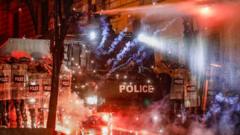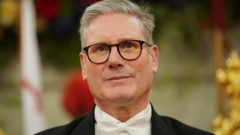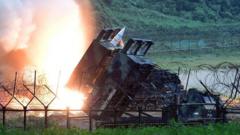Protests in Georgia have erupted over the ruling party Georgian Dream’s controversial political moves, with thousands of citizens filling Rustaveli Avenue in Tbilisi, demanding the government recommit to European integration and democratic principles.
The crisis intensified when Prime Minister Irakli Kobakhidze announced the government would not pursue European Union negotiations for the next four years, effectively distancing Georgia from its Western aspirations. This decision led to significant diplomatic fallout, including the suspension of Georgia’s strategic partnership with the United States.
Protesters, draped in EU and Georgian flags, are challenging what they perceive as an increasingly authoritarian government moving closer to Russian influence. The ruling party denies any connection to the Kremlin, but its recent actions have raised serious questions about Georgia’s political direction.
Nightly demonstrations have been marked by tension and confrontations with police. Law enforcement has used water cannons and tear gas, while protesters have deployed fireworks and whistles. Both sides have reported injuries, with police counting over 100 of their own personnel hurt and protesters experiencing beatings and detentions.
The political landscape is deeply polarized. The opposition, led by groups like Coalition for Change, claims the recent elections were fraudulent and refuses to enter parliament. The ruling party insists the elections were fair and legitimate. President Salome Zourabichvili has been vocal in criticizing the government, suggesting the election was potentially a “Russian special operation.”
Underlying the protests is a fundamental struggle over Georgia’s geopolitical identity. Opposition leaders like Nika Gvaramia frame the conflict as a choice between a European Georgia and Russian influence. The government’s recent laws targeting civil society and LGBT groups have been criticized as reminiscent of Russian-style legislation.
While some speculate about direct Russian involvement, experts like Thomas de Waal suggest the relationship is more complex – a business arrangement rather than a close alliance. However, Moscow likely prefers the current government, which has significantly weakened Georgia’s Western ties.
The protests have spread beyond Tbilisi to other cities like Batumi, Poti, and Kutaisi. Public servants, including several ambassadors, have publicly expressed opposition to the government’s actions.
The opposition is calling for new elections supervised by the EU and US, but the ruling party seems unlikely to concede. Some Georgian Dream supporters hope for potential changes with a potential Trump presidency, though this seems a distant and uncertain prospect.
As temperatures drop, the protests show no signs of abating. The standoff represents a critical moment for Georgia, with the country’s future relationship with the West hanging in the balance. The ongoing constitutional crisis presents a stark challenge to Georgia’s democratic institutions and its international relationships.




